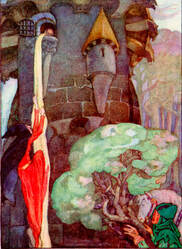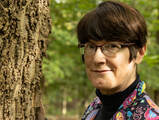| The Book of Gothel is a reframing of the Rapunzel fairy tale from Dame Gothel’s perspective. Most of the story follows the adventures of Gothel as a young girl named Haelewise, who has mysterious fainting spells. Her parents take her to numerous healers and clergymen, seeking a cure. |
The novel recreates medieval Germany with meticulous detail. You can feel the mud and smell the herbs the author describes. The clash between the growing sect of Christianity and ancient folk beliefs creates an undercurrent of tension.
Hildegard of Bingen makes an appearance, though her contribution to the plot is tangential, and her subplot is only vaguely resolved.
She seems like an authorial indulgence rather than a crucial element of the story.
Hildegard of Bingen makes an appearance, though her contribution to the plot is tangential, and her subplot is only vaguely resolved.
She seems like an authorial indulgence rather than a crucial element of the story.
| Political maneuvering and abuse of power are driving forces in Haelewise’s life, which she grasps belatedly and poorly. Most of the story, Haelewise careens from one disaster to the next, with no realistic plan. Following a number of irrational and impulsive choices (typical of YA stories, but annoying and unnecessary to the tale’s unfolding) she is able to take decisive action at the novel’s climax. An impossible romance is at the heart of the novel. Instead of the prince being blinded (as in the Brothers Grimm tale), in this version, no man can see in the mist generated by Gothel’s tower. And the love interest is a tailor, whereas the “handsome prince” is one of the antagonists. |
I got The Book of Gothel from my local library because I enjoy tweaked fairy tales. It delivers on that count.
This could’ve been a great book had the characterization and plot been stronger.
As written, it’s of interest to anyone intrigued by recast fairy tales or German medieval history, but of less interest to the general reader.
This could’ve been a great book had the characterization and plot been stronger.
As written, it’s of interest to anyone intrigued by recast fairy tales or German medieval history, but of less interest to the general reader.



 RSS Feed
RSS Feed